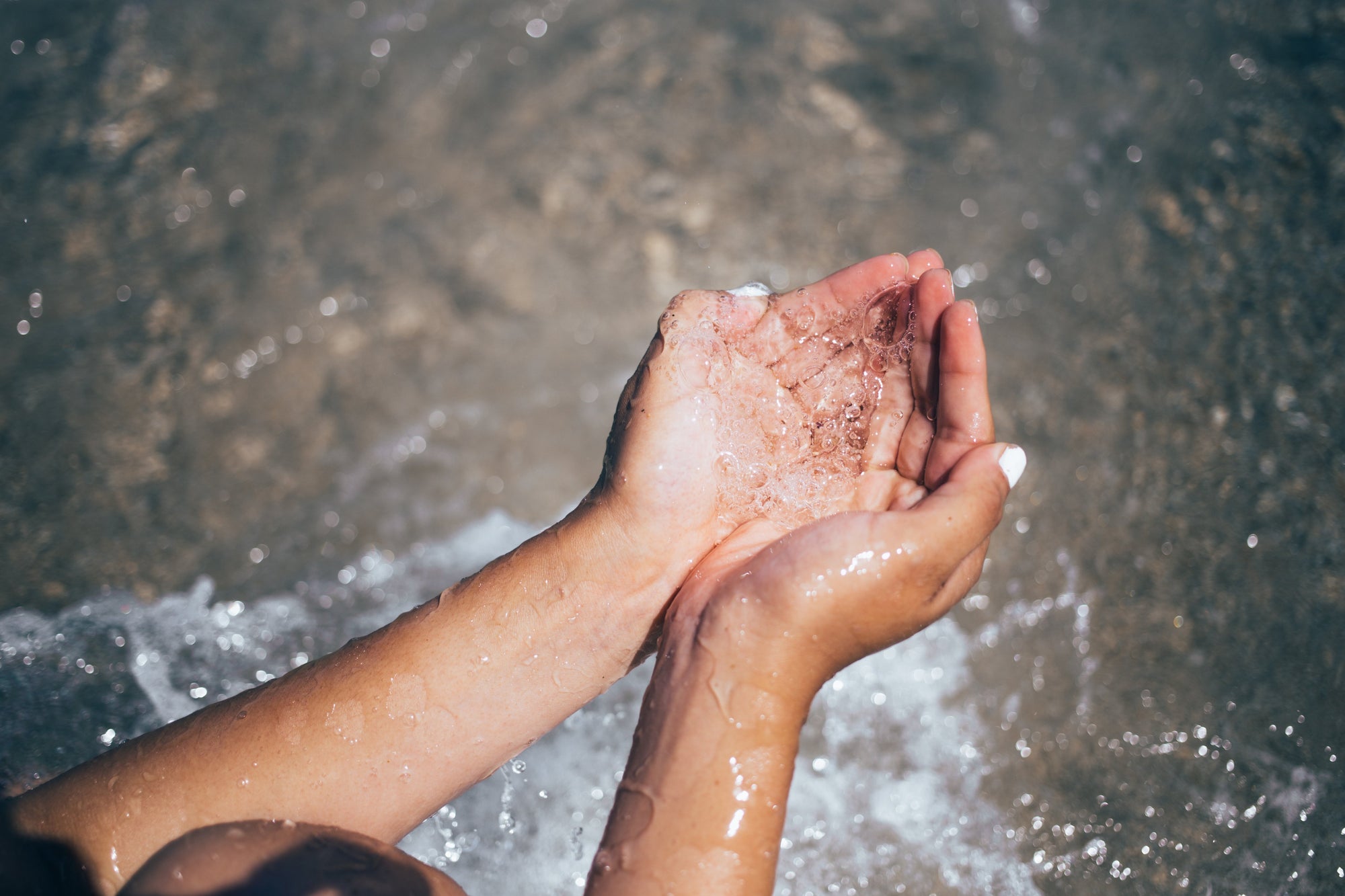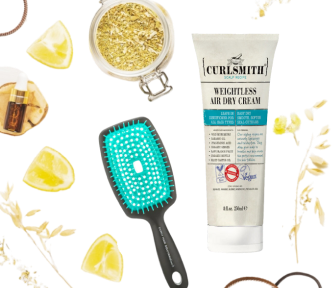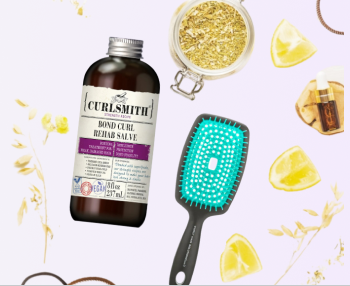Does hard water affect your natural curls and waves? Yes it does.
When you are washing, conditioning, and styling you are using water. And when you are refreshing most of us use water again. On one hand it is fantastic because water is moisture. On the other hand, hair swells when it is in water and can also be dry when it needs water. But make no mistake: your hair needs water.
How can I tell if my area has hard water?
Maybe you notice the build up on a clear shower door or the film in your sinks. Perhaps your white clothes never stay white very long or you see the white residue on glasses after washing them by hand or in the dishwasher. Or maybe your home is serviced by a well which are typically hard water.
With respect to hair, you may notice that your shampoo won’t lather much and you may need to use it twice to effectively clean hair and scalp.
If you aren’t sure if you have hard water in your area, you can look it up online to see what your reading is. My favourite Canadian site to check is Aguatell (click to open in a new window).
Here is a simple chart from Science-y Hair Blog that gives you ppm (parts per million) and gpg (grains per gallon) based on information from the United States Geological Survey.
| Soft Water | 0-15 ppm | (0 gpg) |
| Slightly Hard | 15-60 ppm | (1-3.5 gpg) |
| Moderately Hard | 61-120 ppm | (3.5-7 gpg) |
| Hard Water | 121-180 ppm | (7-10.5 gpg) |
| Very Hard | >180 ppm | (>10.5 gpg) |
Curl Warehouse is in Calgary, which has water ranked at 166-216 ppm. This puts us in the "hard water" category.
What is hard water?
What is hard water exactly? It is by definition the amount of dissolved calcium and magnesium in water. Water will gather these dissolved minerals whenever it flows through and around rocks that have deposits of magnesium and calcium in them.
So just so everyone isn’t worried, hard water is safe to drink because it has the natural minerals calcium, magnesium, and iron. Some people love it and others not so much. We all experience taste differently.
If you have a water softener or are thinking of getting one, let me explain how they work. They will flush your hard water through resin beads that contain positively charged sodium and potassium ions. The sodium and potassium are released into the water as the resin beads attract the calcium and magnesium ions, which are also positively charged. The result of this exchange is softened water containing small amounts of sodium and potassium. A water softener is sometimes a decision made in order to help with dry skin/hair as well as protect the lifetime of washing machines and dishwashers. They are not inexpensive and do have to be maintained correctly and regularly.
How Hard Water Affects Your Hair
Okay, back to hair. Hair washed in hard water may feel sticky and dull because the calcium, magnesium, and iron stay on your hair. It actually bonds to your hair like a conditioner does. If you also have hair damage from heat, color, etc. higher porosity hair will end up with even more build up of hard water deposits. Remember your hair is naturally negatively charged and hard water is positively charged. They will attract each other and these deposits can even go below the surface of the hair.
So what? Well, like product build up, it will eventually make your hair feel dull, stiff, inflexible and frizzy. If there is more iron in your water that “red” color can even transfer onto your hair, especially if you have lighter tones.
I don’t feel this is all bad because some hair, especially finer strands, tends to like hard water. It can impart more texture, grit and volume.

Products for Hard Water Build Up
If getting a water softener is not an option then never fear: there are products that will get those minerals off of your hair. There are a few chelating shampoos specifically meant for hard water build up, and others that include olefin sulfonates which will get rid of product build up too! In that way you will get a 2 for 1 deal by clarifying and chelating at once.
Off the shelf products that are great for chelation (this means removing mineral build up) and clarifying is a brand called Malibu C. Here are Curl Warehouse we do carry a broad range from this brand but I will focus on four specific products.

The most popular are Un-Do-Goo Shampoo and Hard Water Wellness Shampoo. The feedback I have from a small select survey said that most didn’t notice a big difference between the two products. Either way the magic ingredient for hard water removal here is called Disodium EDTA. This ingredient is used in food and cosmetics and it binds with metal ions and prevents metals from accumulating on the skin, scalp, or hair. This is what makes the shampoo "chelating".
Here is a quick comparison between these two shampoos:
- Contains protein
- More glycerin (higher up the ingredient list)
- More cleansing ingredients
- Less Disodium EDTA (lower on the ingredient list)
- pH of 8
- Higher porosity hair tend to like this product better
- No protein
- Less glycerin (lower on the ingredient list)
- More Disodium EDTA (higher n the ingredient list)
- pH of 9
- Lower porosity hair tends to like this one better
If you want to just chelate without an olefin sulfonate, Malibu C has a Hard Water Wellness Treatment in a small one-time-use packet.

If you are a swimmer, Malibu C's Swimmers Wellness Shampoo will help prevent the “green” tinge common to pools treated with chlorine.
There are other ingredients out there that can chelate and you can look to see if you already have something in the cupboard that contains these ingredients. Pentasoidum Pentetate is similar to Disodium EDTA. Please note if you see Tetrasodium EDTA towards the end of your ingredients list, this ingredient is just being used as a preservative and will not actually chelate. As well, if you see citric acid lower in the ingredients list of your shampoo or conditioner, this is used to adjust the pH and not as an actual chelator.
DIY Remedies for Hard Water Build Up
There are also a few DIY recipes that will chelate naturally. These work differently than Disodium EDTA. The measurements below are all low in quantity. You will want to start with small amounts to check the reaction on your hair: some hair does not like vinegars or citrus juice.
ACV Rinse – 15 ml (1 tbsp) per 230 ml of water.
Lemonade Rinse – 1 part lemon juice to 4 parts water.
Citric Acid Rinse (powder) – 0.3 ml per 230 ml of water.
Leave each of these on your hair no longer than 3-5 minutes. They are more of a rinse than a treatment.
How Often Do I Need to Chelate My Hair?
Some followers of the Curly Girl / Curly Hair Method will indicate that using these clarifying shampoos that also chelate should only be done every couple of months. But what if your hair loves it and it doesn’t feel drying? Then I say use as you need. Your hair and water are different than theirs.
Should you chelate if you have a water softener? The answer is yes, because these still leave some residue (sodium ions). If you are clarifying to remove build up might as well get rid of anything else.
I also hear and read a lot about installing a shower filter and your hair and skin will instantly feel better. Although I agree that it removes chlorine, without the salts there is no way a shower filter can “soften” water.
Whenever your hair is acting up one of the best and easiest words of advice I can give is to clarify and condition or deep condition. Try chelating with your clarifying shampoo next time you need a reset and see if getting those minerals off of your hair gives you back your waves and curls.
References
1. Science-y Hair Blog, Hard Water and Your Hair (http://science-yhairblog.blogspot.com/2016/03/hard-water-and-your-hair.html)








